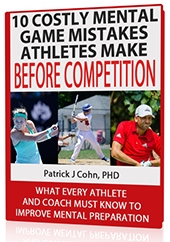
Gaining Life Skills From Sports Psychology
Parents of athletes who have joined a sports psychology program often report that their son or daughter has learned valuable mental skills beyond the athletic field.
They say their kids not only improved confidence and focusing skills for sports, but also were able to apply these same skills to other areas of life, such as academics and relationships.
At first, this was an unexpected benefit of doing mental training with young athletes, but is today is an important advantage of doing mental training.
Working with a sports psychology coach—to improve performance in sports—can help kids learn valuable skills they will use in their lives.
This benefits both the parent and the athlete.
The same strategies that I teach in my sports psychology program, such as how to refocus, are useful in helping athletes cope with distractions in other areas of their lives.
How Sports Psychology Skills Can Become Life Skills
- Focusing On Strengths – many athletes have a habit of comparing themselves to others. Sports psychology helps athletes focus on their strengths. This is important for confidence in relationships, school, and career choice. Building and maintaining confidence is critical for sports and life.
- Moving On From Failures – successful athletes have learned to deal with failure and setbacks. Athletes experience multiple failures in life and in athletics. Sports psychology teaches athletes how to stay confident, move on after failure, and use failure as a motivation to improve.
- Coping with Perfectionism – athletes who are perfectionists have trouble moving on from mistakes and get frustrated after both big and small setbacks. Expecting to perform perfectly in sports and school holds athletes back and makes it harder for them to enjoy the process. Sports psychology teaches athletes about the advantages and disadvantages of perfectionism and how to cope with these problems.
- Learning from feedback or criticism – most athletes want the approval of their coaches, teachers, parents, and teammates. This usually makes it hard for athletes to accept criticism or even constructive feedback. Staying confidence and learning from criticism is another sports psychology strategy that helps athletes succeed in life.
- Staying Composed Under Pressure – successful athletes are able to stay relaxed and confidence under pressure. In the same way, these skills kids learn in sports psychology are important for test taking, presentations, and studying for exams.
Engaging in a sports psychology coaching program does not guarantee that your athletes will thrive in school and relationships. However, they will be more prepared mentally to cope with adversity and move on after mistakes.
Please contact us a Peak Performance Sports if you have any questions about our one-on-one mental training programs for young athletes.
Related Sports Psychology Articles:
- How Athletes Can Balance Sports and Life
- How to Perform in Clutch Game-Time Moments
- Helping Kids Experience The Benefits of Youth Sports
Free Mental Toughness Reports

Get instant access to a mental game report to improve your mental toughness. Are you making one or more of these “deadly” mental game mistakes prior to competition? You can improve your mental game with one of our free sports-specific reports below.
with our free mental toughness reports, you’ll:
- Discover if you have positive or negative pregame jitters.
- Identify your pre-competition mental game mistakes.
- Learn the important pregame mental skills to boost your performance and success!
Learn how mental game strategies can boost your mental toughness in sports with Dr. Cohn’s free mental game reports!
